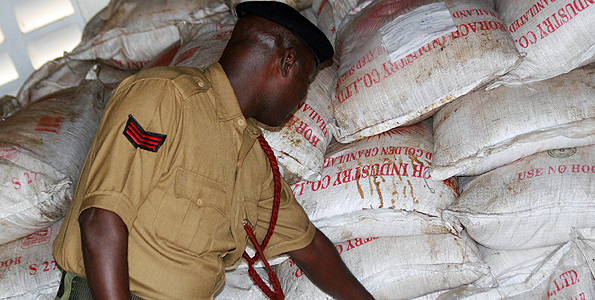
An administration police officer inspects illegal sugar imports impounded by KRA officials at the Lunga Lunga border point in 2006. Investigations show illicit trade in the commodity continues in towns and trading centres along the Somalia border. Photo/FILE

By SAMMY CHEBOI
Saturday, May 29, 2010
A porous border with lawless Somalia and rough terrain continue to drive sugar and arms smuggling in northern Kenya, threatening to cripple the local sugar industry and increasing insecurity.
Although the illegal sugar imports were initially destined for major towns in North Eastern Province like Mandera, Wajir, Habaswein and Modogashe, the barons are now targeting even smaller centres.
Wajir has lately acquired the reputation as the hub of smugglers, thanks to its proximity to the Diif crossing point, dubbed “the Devil’s gateway” by local people.
A narrow panya route leads to the Devil’s paradise, 60 km away on the Kenya-Somalia border. The illegal trade, which also involves electronic goods, is a windfall for some local residents, business people and senior government officials.
Sources privy to the smuggling told the Sunday Nation that those found transporting 200-50kg bags of sugar grease the palms of senior security officials with at least Sh50,000 whereas those trafficking 100 bags part with a minimum Sh25,000.
The illegal trade is said to be linked to the raging militia fights in Somalia and has pushed down the prices of sugar manufactured locally.
The smuggled sugar, which comes from Brazil or Pakistan via Dubai, enters Somalia through Kismayu, Mogadishu and Bosaso ports for onward transit to Kenya where the kingpins reportedly have godowns in major towns.
The barons pay the Somali warlords through whose areas the imports pass a protection fee estimated at Sh100,000 per trip.
Locally milled sugar sells for up to Sh110 a kilo whereas the smuggled sugar goes for as low as Sh60 a kilo.
Kenya has beefed up security along the 682-km border stretching from Liboi to Mandera. But this has only succeeded in slowing down the smuggling business rather than stopping it.
Interviews with multiple sources revealed that although between three and 10 lorries transport sugar through Diif into the country daily, Geriley and Dadajabula border points offer alternatives when military surveillance is tight.
“These guys (smugglers) monitor the movement of the military manning the various points. When the military officers are not manning Diif, the smugglers bring in as much as they can,” one source said.
Three weeks ago, a lorry transporting illegally imported sugar was intercepted by police at Kotulo centre on the Wajir-Mandera road.
In the middle of the bags of sugar, a bag containing 998 bullets was found. Six suspects were arrested, and their case is pending before a Wajir court.
Last year, police seized 200 bags of sugar at Wajirbor, about 70 km east of Wajir town. A week earlier, another consignment was seized in Isiolo, hundreds of kilometres from the Kenya-Somalia border.
Yet another operation in Mandera uncovered six pistols concealed in sugar bags.“We’re vigilant and rely on our intelligence networks to apprehend those engaged in the activity (sugar smuggling).
But we must appreciate that there are not enough police officers to be stationed all along the border,” said Paul Kuria, the deputy OCPD, Wajir.
He defended the force against accusations of corruption, saying that that had become a common song.
“The problem is that people in Nairobi think of the border as a fence. It is not. The nature of topography in this region makes it possible for criminals to drive through the bush and avoid the border point,” he said.
But multiple sources pointed accusing fingers at the police and top government officials, including some at the Kenya Revenue Authority.
Customs officials are said to levy charges on some cargo presented to them by traders in Wajir town. But a resident said the majority of traders smuggle in their goods to reap maximum profit.
Stephen Karuga, KRA’s manager in charge of the northern region, admitted that illegal sugar importation has been a long-standing problem in the area. He confirmed the levying of customs tax on the illegal sugar.
“When we intercept such sugar, we do what we’re expected to do: charge duty,” he said.
The traders are also fined for contravening customs rules, he said. His officers, he added, often find themselves between a rock and a hard place in efforts to stamp out smuggling.
“Even as we do this (control illegal importation), we have to be careful not to get into trouble with the community. There is a community angle to this illicit trade,” he told the Sunday Nation.
Source: Daily Nation